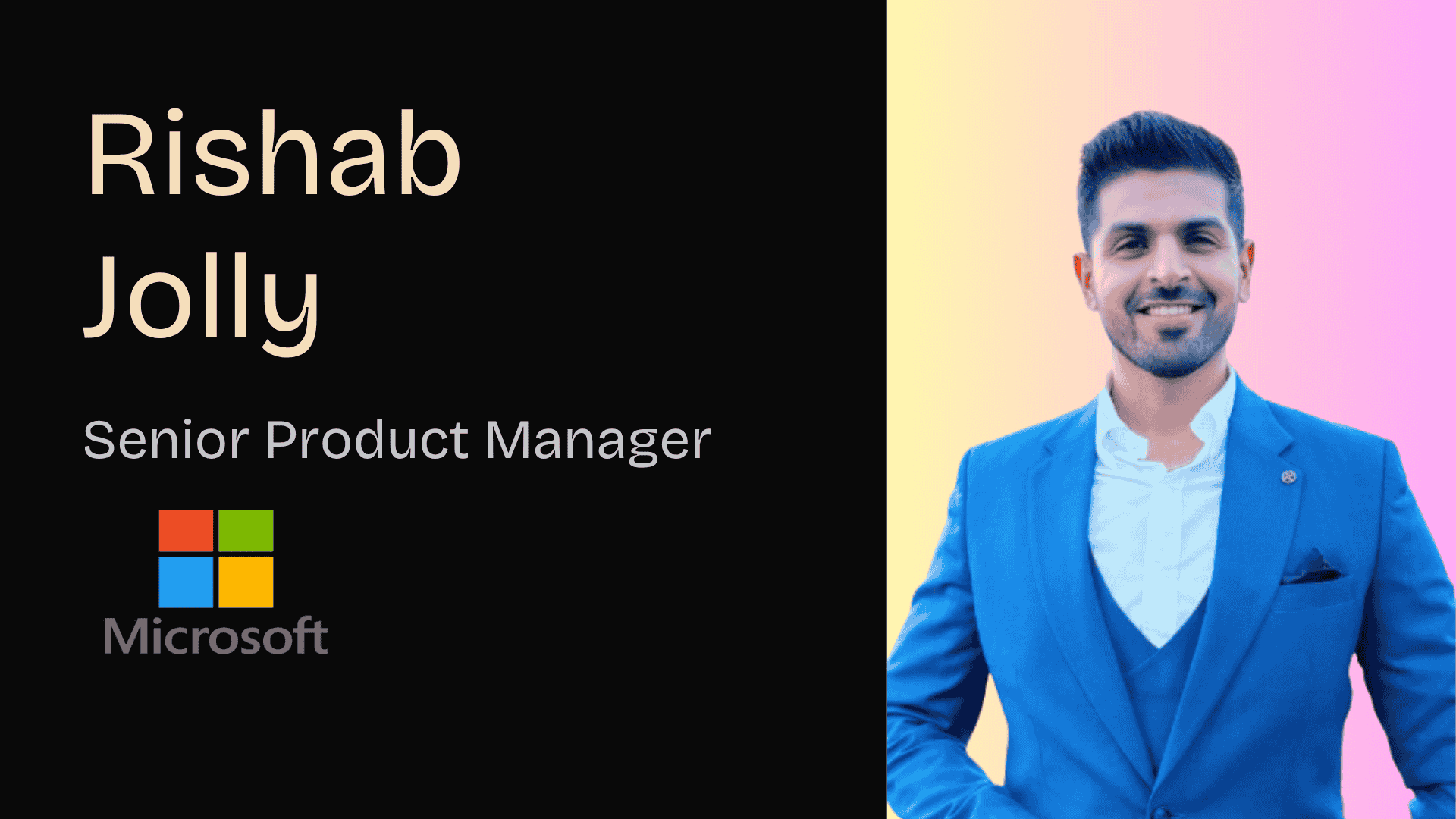Storytelling & Stakeholder influence: AMA with Rishab Jolly
Rishab Jolly is a Senior Product Manager at Microsoft, specializing in cloud observability. With over eight years of experience, he has been navigating the intricate balance between data, user needs, and stakeholder expectations. In this session, he shares insights on storytelling and stakeholder influence in product management—let's dive in.
We're so glad to have you here. As we get started, can you share a little about Cloud Computing PM. How is it different from other PM roles?
As a Cloud Observability Product Manager, my role involves managing cloud-based products and services, focusing on strategy, execution, and understanding user needs. This position requires a blend of traditional product management skills and a deeper technical understanding of cloud computing technologies.
Key Differences:
Technical Proficiency: Cloud PMs need to grasp cloud computing concepts such as infrastructure, scalability, and platform services. This technical knowledge enables effective communication with engineering teams and informed decision-making.
Developer Empathy: Understanding the language and needs of developers is crucial. By aligning product features with developer workflows, we ensure the tools we build are intuitive and valuable.
Infrastructure and Scalability Focus: Unlike some traditional PM roles, cloud PMs must consider the underlying infrastructure; ensuring products can scale efficiently and maintain high availability.
In short, Cloud Product Management is an evolution of traditional product roles, demanding a balance between technical acumen and strategic vision to deliver robust, scalable solutions in the cloud ecosystem.
Thanks so much for your elaborate response. Can you share some tips on how one can crack cloud computing PM roles? Would it require a tech background, or does one need to start as a PM first and then make a lateral move?
While a formal tech background isn't strictly necessary, a solid understanding of core technical concepts is crucial. For example, understanding client-server architecture, distributed systems, and cloud services can make a significant difference. Imagine being tasked with managing a SQL database product; you'd need to comprehend its functionalities to effectively serve your customers.
Tips to Prepare:
1. Build Technical Acumen:
- Familiarize yourself with cloud platforms like AWS, Azure, or Google Cloud.
- Understand the fundamentals of networking, storage, and compute services.
2. Gain Practical Experience:
- Work on projects that involve cloud technologies, even if it's in a limited capacity.
- Collaborate with engineering teams to understand their workflows and challenges.
3. Develop Cross-Functional Skills:
- Enhance your communication skills to effectively liaise between technical and non-technical stakeholders.
- Understand business objectives and how cloud solutions can align with them.
4. Certifications and Continuous Learning:
- Consider certifications like AWS Certified Solutions Architect or Azure Fundamentals to validate your knowledge.
5. Network and Seek Mentorship
Some of our audience could have this question, especially those in the early stages of their careers or in engineering teams. They know what they're doing and are absolute go-getters, but they often get neglected when it comes to pushing new ideas or being heard. Part of this is the perception others have, which is not so easy to change; the other part is how we communicate with others and have our voice heard. Can you throw some light on this?
There are few things I learnt in early stages of my career.
Relying solely on data is not enough. Early in my career, I drowned stakeholders with charts and metrics, expecting them to be convinced. However, I learned that data informs, but stories inspire action. Now, I lead with a compelling narrative that sets the context before presenting the supporting data (easy way to do it a strong before and after).
However, sometimes even these two (data and storytelling) are not enough. To influence effectively, you need to understand each stakeholder's objectives/concerns. And try to appeal to them based on their objectives and concerns. Identify what each stakeholder values—be it revenue growth, system stability, user satisfaction, or innovation and then tailor your message further.
This approach requires extra effort but pays dividends in building trust and securing buy-in.
Found this picture somewhere on the internet and I just absolutely love it. Shows you the power of storytelling.

How do you handle conflicting priorities between cross-functional teams while keeping everyone aligned? These situations often lead to delays in task execution.
This happens a lot, especially in large orgs where each team has their own roadmaps and fire drills.
The approach I take is:
- Anchor on shared outcomes – Re-align everyone to why we’re doing the work. For example, if we're building an alerting capability, I remind teams this isn't just another feature—it's what keeps customer environments stable at 3AM.
- Escalate early, not emotionally – I loop in leadership when needed, not to assign blame, but to help unlock prioritization when there’s real gridlock.
- Create clarity – Even if there’s disagreement, I document trade-offs and next steps so there’s transparency and accountability.
- Delays aren’t always avoidable—but alignment is. The trick is to zoom out from deliverables to impact.
What soft skills do you think are underrated but essential for PMs in large tech companies like Microsoft?
Love this one. Beyond communication and organization, three underrated soft skills stand out:
- Humility – You’ll work with people way smarter than you in engineering, research, and design. Being curious instead of defensive builds trust.
- Pattern recognition – Spotting patterns in stakeholder behavior, customer signals, or org decisions helps you anticipate and influence better.
- Context-switching empathy – The ability to adapt your language between execs, devs, and customers is huge. What sounds inspiring to a VP/exec might sound fluffy to an engineer. Knowing the difference is key. :)
How do you measure your own success as a PM beyond metrics and OKRs? When I reflect on my work each month, I sometimes feel like I'm mostly handling operational tasks.
I keep asking myself - am I growing? Every month or quarter, I ask myself:“Do I understand product, tech, or the business better than I did last month?” or “Am I sharpening my soft skills—like influence, negotiation, storytelling?” This helps shift focus from just delivery to development. Even if the work feels operational, if I’m learning how to navigate complexity or becoming more articulate, I count that as a win.
Being a PM in 2025 is quite different from what it was pre-COVID. A few things have definitely evolved—there’s greater awareness, better training resources, and more recently, the rise of AI. Given this shift, how would you advise someone to prepare for a PM role in today’s landscape?
You’re spot on—PM in 2025 is a different game. Remote work normalized async collaboration. There's way more awareness around product frameworks. And AI has added a whole new dimension to how we build and operate. A Few things I'd do:
1. Master the Fundamentals, but Don’t Stop There: Learn core PM skills—user research, prioritization, stakeholder management, road mapping. But also go beyond: understand go-to-market, product-led growth, and developer ecosystems (if relevant).
2. Get Comfortable with AI: Tools like ChatGPT, GitHub Copilot, and Notion AI are changing how we write PRDs, analyze feedback, and build faster. Learn how AI is being embedded into products—not just how it works, but how it shapes user experience and decision-making.
3. Build in Public or Join Communities: There’s a vibrant PM community now—LinkedIn, Slack groups, newsletters, podcasts. Learning happens faster when you're around others who’re doing the work too. Leverage that!!!!
4. Sharpen Soft Skills Like Never Before: Remote PMing means influencing without hallway conversations :(. Hone written communication, async storytelling, and emotional intelligence. These are your superpowers now.
Some of us are keen on pursuing an international career. Given your background and experiences, including moments of déjà vu, could you share some best practices for staying resilient and sustaining through tough times?
I’ve definitely had my share of tough moments—moving countries, adjusting to new cultures, navigating visa challenges, and proving myself in a global company.
Few things that helped me stay grounded and move forward:
- Create Your Community Early: Don’t wait for things to get hard. Whether it’s mentors, local friends, or online communities—having your tribe makes a world of difference, especially in low moments. Mentors have been my blessing.
- Be Visible, Especially When Remote: In global roles, your work won’t always speak for itself. Learn to communicate impact clearly. One small win shared with the right framing can open doors.
- Hold on to Long-Term Perspective: In the short term, the journey might feel chaotic. But zooming out helps. You’re building something few people get to: a global career with real impact.
One final question: You’ve built a great career while consistently maintaining an active presence on social media. Do you have any tips on how to balance both effectively?
Thank you! I’ll be honest—it’s not always perfectly balanced, but here’s what’s worked for me so far.
- System, not hustle: I treat content like product. I batch-create/record podcasts and ideas on weekends, schedule posts ahead, and try to be consistent when I can. Consistency > perfection.
- Be intentional, not reactive: I don’t post to go viral—I post to add value. That makes it easier to stay consistent even when engagement dips.
- Protect deep work hours: Social media never comes before strategy docs or team reviews. I time-box posting or engagement (early morning or end of day) so it doesn’t eat my PM brain.
At the end of the day, your real work gives you the stories—and your stories fuel your presence. When they feed each other, it’s not a drain, it’s a loop.
About the Host:
This AMA was hosted by Mohamed Yasiruddin, a data-driven Product Manager with well-rounded experience across IT/SaaS, e-commerce, and greenfield projects. With a passion for making meaningful impact in the tech world, he excels at the intersection of business strategy and technology execution.
Want to join the next conversation? We’ll be having another Product Chat soon, get your invite to our Slack community to get all the details. See you inside.
.gif)




.avif)
.avif)

.avif)
.avif)
.avif)

